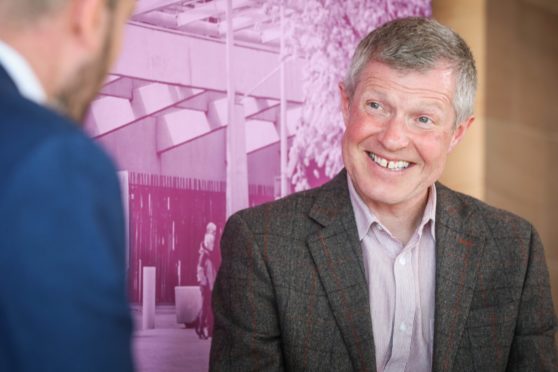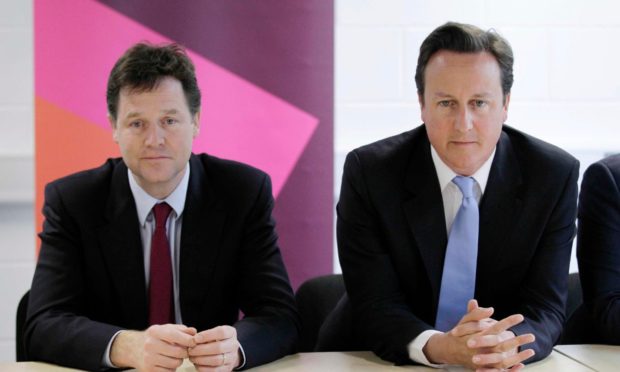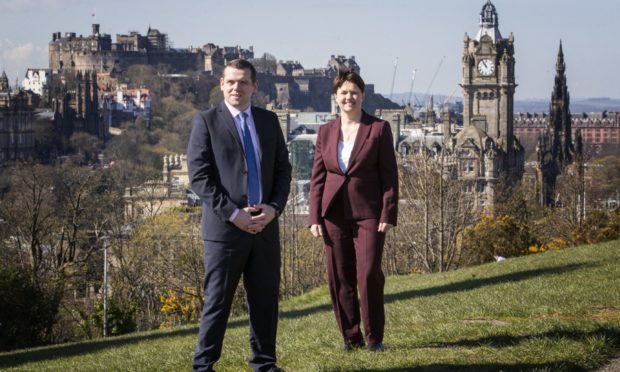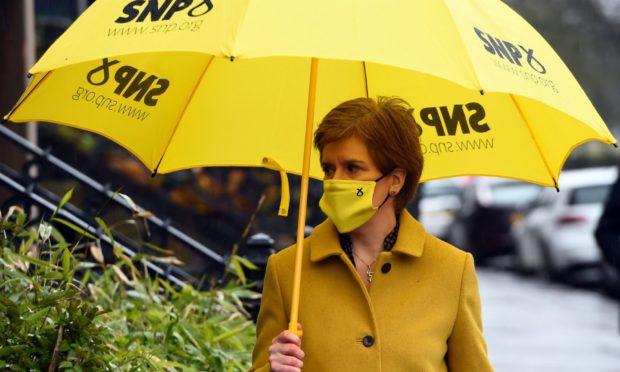Willie Rennie has said there are no circumstances in which he would consider it “reasonable” to hold a second referendum on Scotland’s independence.
The Scottish Liberal Democrat leader said he would “never” conclude that another vote on the nation’s future was justified, because he continued to believe the UK was “better together”.
Despite his comments, he insisted there was still a “big market” for the Lib Dems among independence-backing voters who wanted to “put the recovery first”.
In an in-depth interview, Mr Rennie also warned of “quite considerable” anti-English sentiment among sections of the Yes support, which he urged Nicola Sturgeon to address.
And in a fresh attack on Scottish Conservative leader Douglas Ross, he claimed that “most of the problems” with the UK were caused by the Tories, despite their claim to be its saviours.
Mr Rennie was speaking to David Clegg, editor of The Courier, in the first of a series of in-depth interviews with the main party leaders ahead of the Scottish election.
He was asked when he believed it would be reasonable to hold a second independence referendum.
“I’ll never think it is reasonable to have one, because I think we’re better together in the United Kingdom,” Mr Rennie said in response.
I’ll never think it is reasonable to have one, because I think we’re better together in the United Kingdom.”
When questioned on how democratic that stance was, for a party with the word “democrat” in its title, he said: “Often people try to predict the result this time around, which is hypothetical.
“Predicting results in future years’ time is even more hypothetical, so I’m not going to go there.”
He added: “I’m saying for the next five years, let’s agree to disagree about the independence thing, and focus on the recovery.
“And there’s a big market for that out there. There’s a lot of people who say, ‘yeah, that’s the right thing’.
“It jars to have a referendum, when thousands of people have lost their lives and thousands more have lost their jobs. It seems really odd.”
Mr Rennie believed the SNP vote was “softer than I have seen for ages”, and that his party can prevent a majority for Ms Sturgeon by winning key seats, such as Caithness, Sutherland and Ross.
But the polls suggest the Lib Dems, who have won five seats at the last two Holyrood elections in 2011 and 2016, may be on course for another underwhelming result on May 6.
Dramatic decline
It has been a dramatic decline for a party that returned 17 MSPs in the first two parliaments, followed by 16 in 2007.
Mr Rennie put it “mostly” down to the party’s coalition with the Conservatives at Westminster from 2010 to 2015.
“I saw the benefits of having a coalition to try and stabilise the country. But, you know, at some point you have to move on,” he said.
“And of course there are things I regret from that time, but the challenge now for me is to try and get the party into a better state.
“Get trust back, make progress in terms of delivery of things so people know there is a value in voting for us, and then improving our campaign organisation, so we can take the message out to wider areas.
“So that is why I’m hopeful that this time we can grow in terms of seats.”
His future
The 53-year-old, who has led the Lib Dems at Holyrood for a decade, suggested he was not considering stepping down after the election, if the party fails to make such gains.
“No, I mean who knows what is happening in the future, but I love politics,” he said.
“You can tell I enjoy the cut and thrust, I enjoy making a difference, and I enjoy election campaigns.
“So, yeah, no, I think – I don’t know quite when – but I’ve got no appetite to give up yet.”
With the SNP considered a near certainty for victory on May 6, the opposition party leaders have been focussing their fire on each other in recent weeks.
It has included an attack by Mr Rennie last week on Mr Ross, who he described as a “dark” force in Scottish politics.
Douglas Ross
The Lib Dem leader said: “It’s the kind of politics that I came into politics to oppose.
“I mean I’ve never been a fan of Conservative politics… (but) Ruth Davidson’s style of Conservatives was much more palatable.
“She was a much more open, liberal, internationalist in outlook. Douglas isn’t any of that… he backed Boris Johnson to be the leader of the Conservative Party, the things he said about Gypsy Travellers were pretty unpalatable.
“The thing that really irks me about the Conservatives is that they claim to be the defenders of the United Kingdom, but they are the ones that cause most of the problems with the United Kingdom.
“That’s the problem. He thinks he is saving the United Kingdom, but he’s actually causing it an awful lot more difficulties with the way he approaches it.”
The thing that really irks me about the Conservatives is that they claim to be the defenders of the United Kingdom, but they are the ones that cause most of the problems with the United Kingdom.
Mr Rennie was more cautious when asked if he believed there was any darkness in Ms Sturgeon’s politics.
“With nationalists in general there is an element of it that is quite dark, which is why I oppose independence,” he said.
“I prefer to be open, outward-looking, internationalist. That’s the kind of politics that I embrace, and there’s elements of what Nicola argues for is that, there’s no doubt about it.
“There are elements within the nationalist movement that don’t argue for that.
“I mean the anti-English sentiment that is around is quite considerable in some parts and they need to do an awful lot more to clamp down on that.”
Mr Rennie suggested SNP Westminster leader Ian Blackford had been “dabbling in that from time to time”, citing a tweet that inaccurately accused a photographer, who had moved to Caithness from England, of breaking Covid rules.
He also highlighted protesters gathering at the border between Scotland and England.
Asked if he believed Ms Sturgeon encouraged this element, Mr Rennie said: “No, there’s a nationalist movement that encourages that behaviour and Nicola Sturgeon has got a special duty to make sure that is dampened down.”
Mr Rennie believed the controversy surrounding Alex Salmond and the handling of allegations against him at the end of the last parliament had been “pretty ugly and poisonous”.
And he also described the debate over transgender rights as “really challenging”, as well as being “heated and divisive”.
The Scottish Lib Dems outlined their policy on that topic and more than 50 others when they published their manifesto on Friday.
Mr Rennie was questioned in the interview on why his party could once again finish fifth next month, or even sixth, despite its priorities seeming to focus on the issues that are most important to voters.
“I’m puzzled as well,” he joked.
“I think we’re saying all the right things, we’ve got good people, we’ve got some cracking candidates – more women than ever before in top positions.
“So I think we’re right in tune with what people, I think, believe are the priorities.
“My job in the next three weeks is to make sure everybody knows that.
“And perhaps they don’t know it yet, maybe I’ve not engaged enough with them, that could be part of it, but we’ll find out on May 6.”



